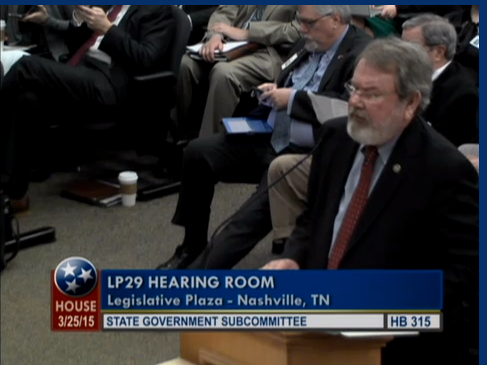Bill to allow new public records fees pulled from House consideration
State Rep. Steve McDaniel this morning took off notice a bill that would allow new charges to be assessed citizens who want to inspect public records.

Ann Butterworth is the Open Records Counsel who would be in charge of making the final recommendation, although McDaniel’s comments indicated that discussions and hearings would include members of the Advisory Committee on Open Government. The Advisory Committee has 14 members and 3 ex-officio members, including the chairs of the Senate State and Local Government Committee and House State Government Committee. (TCOG has a seat on the Advisory Committee, as do other civic groups such as the League of Women Voters, and representatives from government, such as the Tennessee School Boards Association and Tennessee Municipal League.)
For the first time since ACOG was formed in 2008, Butterworth convened the group to meet weekly during the legislative session this year to discuss via conference call proposed legislation that would impact open records and open meetings law with the possibility of submitting comments to the Legislature. The group has made one written comment, expressing concern about a bill that would exempt all of the TSSAA’s records from the Tennessee Public Records Act. The group spent considerable time hearing from the representative of the school boards association about its proposed bill, and discussed the issue of fees, but did not get to any point of consensus on the proposal or whether the group should offer comments to the Legislature about it. (Recordings of the meetings are not available as the Office of Open Records Counsel, unlike in previous years, did not record and archive them on its website for the public to view later.)
The Tennessee Public Records Act states that “A records custodian may not … assess a charge to view a public record unless otherwise required by law…” The school board association’s bill would eliminate that and instead allow per-hour labor fees for time spent to prepare documents for inspection — including time spent retrieving and redacting — after the first hour, and first 25 copies.
A bill that would allow such labor charges in 2011 said governments in Tennessee would collect an addition $1.7 million in revenue from them, but the new fiscal note says any increase in revenue to state and local government “is estimated to be not significant.” The new fiscal note did state that, “Based on information from multiple state-level departments, allowing records custodians to charge a reasonable fee, will to some degree, discourage requests for open records inspections. As a result, there should be a recurring decrease in expenditures for state and local government. However, given the first hour of labor and the first 25 copies are to be provided free of charge under the provisions of the bill; any such reductions in expenditures are assumed to be insignificant.”
TCOG has also pointed out that charging new fees would likely block citizen and journalist access to public records, and has advocated considering other innovative ways to reduce the cost to government that would balance the right of citizens to see non-exempt government records, as well as improve government transparency in general.




